Matt Rees's Blog - Posts Tagged "omar"
The Guardian: 5 Foreign Sleuths to Read
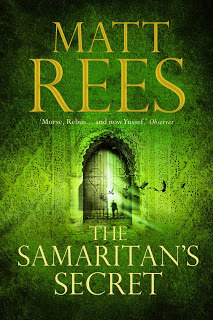
The Guardian recently ran an interesting article seeking to explain the popularity of crime novels set in "exotic" locations -- either written by locals or by foreigners living there. The article makes a few worthwhile points about the basics of this new-ish sub-genre. It also includes a list of the top five such "foreign" sleuths recommended by the newspaper:
Inspector Chen -- from the novels of Qiu Xialong
Dr Siri -- Colin Cotterill
Precious Ramotswe -- Alexander McCall Smith
Yashim Togalu -- Jason Goodwin
and, of course,
my own Omar Yussef, the Bethlehem schoolteacher who's forced into detective work by the lawlessness of Palestine.
The Writing Life interview: Barbara Nadel
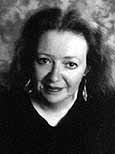
One of the jobs authors are required to perform to help promote their work is the strange task of procuring from other authors something called a “blurb”—the praise you’ll find on the back cover of books. They ought to come from authors whose readers might also be interested in your book--that's the idea. In 2006, when I sent out advance copies of my first novel “The Collaborator of Bethlehem,” I had no doubt I wanted one to go to Barbara Nadel, winner of the Crime Writers Association Silver Dagger the previous year. Her fabulous series of novels about Istanbul detective Cetin Ikmen delves into a society that we think we know a great deal about – only to demonstrate how much more complex is the reality. That’s one of the things I was trying to do with my Palestinian detective Omar Yussef. I’m pleased to report that Barbara recognized that, and she was kind enough to read and comment (favorably!) on my book. She’s published 11 terrific Turkish novels and is about to publish a new novel in her other series, in which the hero is a London undertaker. The two series are rather different and make varied demands on this intelligent writer, so I thought it’d be fascinating to ask her about The Writing Life.
How long did it take you to get published?
I first started trying to get published in 1992. At that time the notion of a mystery book, much less a series set in Turkey, was rejected as almost laughable. I’ll be honest, I gave up and put my first book Belshazzar’s Daughter in a drawer for 7 years. The only reason I ever took it out again was because in 1999 I was, yet again, totally broke and I thought, ‘why not give this old thing one more go? Maybe someone will give me some cash?’ So I sent it to an agent who, on this occasion, liked it. The next thing I knew I was involved in a three book contract! Now ten years on, I write two mystery series; the Inspector İkmen stories set in modern Turkey and the Francis Hancock mysteries set in 1940s London.
Would you recommend any books on writing?
I have to admit that I’ve never read any!
What’s a typical writing day?
I live in the north of England and so my first task of the day is to look out of the window and see what the sky is doing. That done, I try to get to my desk by about 8am and then work through until lunchtime. I don’t generally do lunch – a legacy of past chain-smoking – but just have a cup of tea and maybe, just occasionally, a cigarette. I’ll then work through until about 5 or 6pm. I don’t do this every day but try to work this schedule Monday to Friday if I can. I have pretty heavy family commitments and so it’s not always possible.
Plug your latest book. Why is it so great?
I have two books out next month, one paperback, an İkmen mystery called River of the Dead, and a new Hancock hardback called Sure and Certain Death.
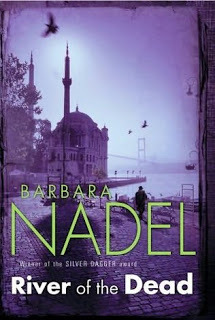
River of the Dead sees İkmen and his protégé Suleyman, in pursuit of an escaped prisoner. Yusuf Kaya is a murderer and drug dealer and when he escapes from prison in İstanbul it is suspected he has had help. Also because Kaya’s home town is in eastern Turkey it is strongly suspected he has gone back there. And so while İkmen pursues the investigation in İstanbul, Suleyman flies out to the eastern city of Mardin. There he finds not only drug dealing, gun running and the threat of terrorist attack, but also an exotic mix of people including Kurds, Suriani Christians and those who believe in an ancient snake goddess, the Sharmeran. This book came about as a result of a trip I made out to Mardin in 2007 and is I hope imbued with the same sense of magic and unreality that I found there. That said River of the Dead is also a tough book which address very real issues I talked to people about in Mardin, like the Iraq war. I think it’s great because although it is a crime story it is also a social commentary as well as, hopefully, introducing some people to the glories of south eastern Turkey.
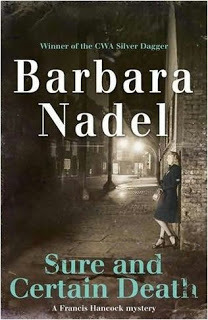
Sure and Certain Death is about a series of killings that take place in the London Borough of West Ham in 1941. Middle aged women are being attacked and eviscerated. Local people start whispering about Jack the Ripper being on the prowl again. One such victim is discovered in a bombed out house by undertaker Francis Hancock. A veteran of World War I, Francis suffers from shell-shock which means that sometimes he doesn’t always know that what he is experiencing is actually real. But soon the murders come close to home and he finds himself fearing for his own sister. Sure and Certain Death is a story about World War 2 that has its murderous roots in the darkest corners of Word War 1. I think it’s a good book because it is not either an obvious murder story or a straightforward story of the London Blitz. My father experienced the Blitz when he was a child and although the Hancock books do tell of the heroism of that time, they also aim to tell it like it was too. Francis Hancock’s world is therefore one of privation, dirt, anxiety and sometimes madness.
How much of what you do is dictated by genre formula, personal formula or complete originality?
My aim is always not to write to formula but to produce something fresh every time. However within the crime/mystery genre there are certain constraints, like having a ‘tidy’ ending. Not to do this is unsatisfying for the reader, even though I do sometimes want to reflect the sheer messiness of real life. In addition series characters do have back stories which have to be addressed in some form in every book and so formula could be said to apply there too. In the main however I don’t write to formula.
What’s your favourite sentence in all literature and why?
From Great Expectations by Charles Dickens. These are the first words Miss Havisham ever speaks to Pip. They sum up both the bitterness and the tragedy of her situation perfectly.
‘This,’ said she, pointing to the long table with her stick, ‘is where I shall be laid when I am dead. They shall come and look at me here.’
She knows that her relatives will only ‘come and look’ at her. They won’t grieve. They are only interested in her money. All this is conveyed so well in this cold little sentence.
How much research is involved in each of your books?
Quite a lot, although of course it does depend on the book. For River of the Dead I had to go to Mardin and its environs and talk to people so that was pretty full-on. With the Hancock series of course I have to do historical research into aspects of World War 2 every time. Enjoyable but time consuming.
Do you live entirely off your writing? How many books did you write before you could make a living at it?
For the first 6 years of my writing career I couldn’t make my living just from my books. I had a day job in a psychiatric hospital and wrote at night and at weekends. Since the Hancock series began however (4 years ago) I have (just) been able to survive on writing. However it’s not easy and I do have to supplement my income by writing short stories and bits of journalism.
How many books did you write before you were published?
I had one academic book published before ‘Belshazzar’s Daughter’ but no fiction. Not that I didn’t try. I wrote two books which I haven’t had published. Goodness knows if they’ll ever see the light of day!
What’s the strangest thing that ever happened to you on a book tour?
Meeting an old man who was called Mr İkmen and then, not twenty four hours later, seeing a Turkish policeman who looked just like my internal vision of İkmen’s protégé, Suleyman!
What’s your weirdest idea for a book you’ll never get to publish?
A horror story about a Victorian side-show man who kills people and then places them in sentimental tableau which he charges the public one penny to view. Ghastly and weird and clearly the product of a brain that is not what it should be. Mind you, Goths would like it I am sure!
May Allah bless such reviewers
America, the National Catholic weekly, includes a great review of The Samaritan's Secret, the third of my Palestinian crime novels, this week. "Rees masterfully concocts another claustrophobic tale from the occupied territories that takes us deep into the Palestinian experience even as it entertains," writes Claire Schaeffer-Duffy. She also calls my detective Omar Yussef "endearingly cranky." God bless him.
May Allah's blessings also fall upon the reviewer in Denmark's Information, who writes of the second of my novels "A Grave in Gaza" (UK title: The Saladin Murders): “Matt Rees who has run Time Magazine’s office in Jerusalem has traveled and lived amongst Palestinians and Israelis for years, and he knows what he’s talking about. This is why his new crime novel is both tremendous and terrible. It not cheerful, in fact it’s rather tragic, but Omar Yussef is a warm, jolly and lively acquaintance and the novel is certainly worth a read to find out what goes on behind the scenes in the Palestinian territories.“
Just to show that I prefer not to leave my books entirely in the hands of even the best of reviewers, the Media Line's Jerusalem bureau interviewed me for US radio stations a couple of days ago. Here I talk about my books and how I came to write them.
May Allah's blessings also fall upon the reviewer in Denmark's Information, who writes of the second of my novels "A Grave in Gaza" (UK title: The Saladin Murders): “Matt Rees who has run Time Magazine’s office in Jerusalem has traveled and lived amongst Palestinians and Israelis for years, and he knows what he’s talking about. This is why his new crime novel is both tremendous and terrible. It not cheerful, in fact it’s rather tragic, but Omar Yussef is a warm, jolly and lively acquaintance and the novel is certainly worth a read to find out what goes on behind the scenes in the Palestinian territories.“
Just to show that I prefer not to leave my books entirely in the hands of even the best of reviewers, the Media Line's Jerusalem bureau interviewed me for US radio stations a couple of days ago. Here I talk about my books and how I came to write them.
Toronto Star: Palestinian crime novels the key to happiness
Toronto Star Mideast correspondent Oakland Ross writes about my path to happiness -- via the less than happy occurrences of the region. It's a different, more personal kind of profile than the sort of thing journalists usually write, which is perhaps due to the novelist's sensibility Oakland brings to the piece (He's the author of historical novels set in Mexico.)
Welsh writer quit Time magazine to pen books in popular sleuth series
May 27, 2009 Oakland Ross MIDDLE EAST BUREAU
JERUSALEM–Happiness did not find Matt Beynon Rees.
Instead, Matt Beynon Rees found happiness.
First, however, he was obliged to travel to the Middle East, not a region of the world noted for an over-abundance of glee. Read more...
Welsh writer quit Time magazine to pen books in popular sleuth series
May 27, 2009 Oakland Ross MIDDLE EAST BUREAU
JERUSALEM–Happiness did not find Matt Beynon Rees.
Instead, Matt Beynon Rees found happiness.
First, however, he was obliged to travel to the Middle East, not a region of the world noted for an over-abundance of glee. Read more...
Can't wait for The Corruptionist
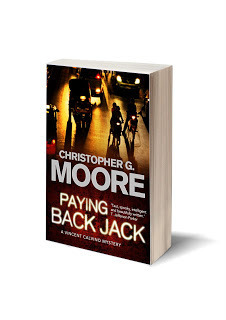
I heard from my chum Christopher G. Moore that he just finished writing the 11th in his series of Vincent Calvino crime novels set in Bangkok. That's good news, because I already read his brilliant and forthcoming Paying Back Jack. (See my review "Elmore Leonard in Bangkok"). Knowing Chris's work, I already love The Corruptionist -- I'm enjoying guessing how he'll use that terrific title and his vibrant cast of characters to take us on another superbly original dive into the underworld of Bangkok.
On his blog, Chris recently wrote about my latest Palestinian crime novel, The Samaritan's Secret. I'm delighted he enjoyed it -- not only because I'm such an admirer of his writing, but also because we share a birthday/a UK publisher/a style of examining the foreign culture in which we live through gritty crime fiction which exposes something you'd never expect about the place. Here's what he wrote:
"Matt Beynon Rees is another author who knows the territory, the people, and the nature of the personal conflicts that separate them. Matt’s turf is Palestine, and his novels are brim with people caught in the vice of poverty, tribal and clan conflict, and facing the constant possibility of violence. He brings Palestine to life. And that is no easy thing.
"One of Matt’s Omar Yussef mysteries does more to take a person into the day-to-day reality of the lives of people in Gaza than a library of newspaper and magazine analysis of Middle East politics. Ultimately understanding countries like the Palestine and North Korea are tied to their history, language, enemies, and traditions. The reality of such a country becomes understandable through emotional lens of the people who live there. Matt channels the sensibility of Graham Greene in this series, building a picture of a time and place that stays with you long after you finish the book."
So while you're waiting for The Corruptionist, get stuck into the first 10 Calvino novels. You won't be disappointed.
Published on June 07, 2009 07:21
•
Tags:
asian, bangkok, calvino, christopher, corruptionist, crime, g, jesus, moore, nablus, omar, palestine, samaritan-s, samaritans, secret, thailand, vincent, yussef
Grassroots signs for my Palestinian crime novels
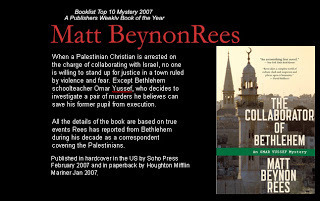
A new review in the Ann Arbor Chronicle suggests healthy grassroots popularity for my Palestinian crime novels. The review of my first Palestinian crime novel "The Collaborator of Bethlehem" (UK Title: The Bethlehem Murders) is written by Robin Agnew, owner of Aunt Agatha's Mystery Bookstore in Ann Arbor. She writes: "When enough customers ask you about a certain author in a short period of time, it makes you take notice. When several of my more discerning “guy” readers mentioned Matt Rees as a wonderful writer, I was intrigued enough to pick up the first book."
Robin goes on to say:"Rees is able – like the very best of novelists – to convey absolute horror without sentimentality. Some of the things that happen in this book will probably haunt you, but they also seem like things that can and do happen. The real bit of grace in the book is the way Yussef chooses to deal with what happens. He shows that even a somewhat frail 56 year old can find a reason to move ahead in the world. I can’t recommend this book highly enough." Read the full review in The Ann Arbor Chronicle.
Thriller Bugbear #69: Plot-Point Techno Madness!
Much as I love Nordic crime fiction, the Europewide megaseller “The Girl with the Dragon Tattoo” by Stieg Larsson made me want to throw knives like the Swedish chef on The Muppet Show. Why?
Two reasons.
First, the minor reason. Written by a (tragically deceased) Swedish journalist, the book is entirely in the style of a magazine article. Complete with page after page of “research.” It’d be enough for the author to tell me that Swedish women are often assaulted by men. I don’t need five pages of real background. A writer ought to understand that the greater the temptation for the reader to skim, the worse the book is. You end up with a good 250 page mystery trapped inside a 600 page monster.
Overloading with journalistic background is a common technique in contemporary thrillers and mysteries. It’s as though making things up was somehow a distortion of reality. Whereas it actually gets you a lot closer to reality than journalism or journalistic techniques, because it opens up the reader emotionally. (That’s what I’ve found with my Palestinian detective series.)
Second, the major reason. The Internet.
In “Dragon Tattoo,” the eponymous heroine is the now generic thriller/mystery character: the Internet hacker genius. Whenever Larsson needs to inject some new information or to unravel a tricky plot point, his hacker opens up her laptop and links into www.secretgovernmentinformation.com, the well-known (to fiction writers) site where all governments, in particular their intelligence networks, store material they want to be sure is available only to fictional hacker geniuses (and by proxy to thriller writers).
“Dragon Tattoo” isn’t the worst offender. Just the biggest seller.
But I’m only naming names here because poor old Larsson is dead. Those (here unnamed) living writers who use this technique ought to be ashamed of themselves.
In my novels the only time the Internet comes up is when detective Omar Yussef’s granddaughter sets up a website for him in her attempt to make him seem more professional. “The Palestine Agency for Detection,” as she calls her site, is merely embarrassing to Omar. No plot-point-shifting Houdini act there.
The Internet has essentially taken over from the Mossad as the thriller writer’s cure-all. In the old days, if there was something your main character couldn’t figure out, all he had to do was get in touch with the nearest Mossad agent, who’d be sure to know all the secrets in the world and was happy to pass them on with a few dark words about never forgetting the Holocaust and a cheerful “Shalom.”
As a resident of Israel, I can tell you the Mossad doesn’t operate that way. Neither does the Internet.
So stop writing books that pretend it does. (I wonder how you say that in Swedish...)
Two reasons.
First, the minor reason. Written by a (tragically deceased) Swedish journalist, the book is entirely in the style of a magazine article. Complete with page after page of “research.” It’d be enough for the author to tell me that Swedish women are often assaulted by men. I don’t need five pages of real background. A writer ought to understand that the greater the temptation for the reader to skim, the worse the book is. You end up with a good 250 page mystery trapped inside a 600 page monster.
Overloading with journalistic background is a common technique in contemporary thrillers and mysteries. It’s as though making things up was somehow a distortion of reality. Whereas it actually gets you a lot closer to reality than journalism or journalistic techniques, because it opens up the reader emotionally. (That’s what I’ve found with my Palestinian detective series.)
Second, the major reason. The Internet.
In “Dragon Tattoo,” the eponymous heroine is the now generic thriller/mystery character: the Internet hacker genius. Whenever Larsson needs to inject some new information or to unravel a tricky plot point, his hacker opens up her laptop and links into www.secretgovernmentinformation.com, the well-known (to fiction writers) site where all governments, in particular their intelligence networks, store material they want to be sure is available only to fictional hacker geniuses (and by proxy to thriller writers).
“Dragon Tattoo” isn’t the worst offender. Just the biggest seller.
But I’m only naming names here because poor old Larsson is dead. Those (here unnamed) living writers who use this technique ought to be ashamed of themselves.
In my novels the only time the Internet comes up is when detective Omar Yussef’s granddaughter sets up a website for him in her attempt to make him seem more professional. “The Palestine Agency for Detection,” as she calls her site, is merely embarrassing to Omar. No plot-point-shifting Houdini act there.
The Internet has essentially taken over from the Mossad as the thriller writer’s cure-all. In the old days, if there was something your main character couldn’t figure out, all he had to do was get in touch with the nearest Mossad agent, who’d be sure to know all the secrets in the world and was happy to pass them on with a few dark words about never forgetting the Holocaust and a cheerful “Shalom.”
As a resident of Israel, I can tell you the Mossad doesn’t operate that way. Neither does the Internet.
So stop writing books that pretend it does. (I wonder how you say that in Swedish...)
Stranger than zinc bars and literary fiction
Foreign correspondents are always more enthusiastic about Beirut than about Amman. Just like critics prefer “literary” fiction to crime novels.
It seems to me they’re both wrong, and for the same reasons.
Visiting reporters always rave about Beirut. Mainly because there’s a very un-Middle Eastern nightlife there. Zinc bars. Beautiful girls in spaghetti-strap tops beside the zinc bars. Booze, dance clubs, DJs.
They’re not really interested in the broken-down refugee camps or the ride up into the Shouf Mountains or the remnants of wars, bulletholes dug into the walls of buildings both inhabited and abandoned. It’s the zinc bars, that’s all. The things that are just like home.
But Amman. It’s “boring,” because despite its size it’s somehow still a big Bedouin encampment. Slow and formal.
Foreign, in fact.
Turns out, foreign correspondents aren’t so interested in “foreign” places. That’s why they like the bars, zinc or otherwise, at their hotels.
Amman has an astonishing history. It was one of the 10 Roman cities of the region – the original Philadelphia, according to its ancient name. The oldest parts of town down in the valley between the hills where the wealthier people live aren’t picturesque in the way central Damascus is. But they’re teeming with life and with conflicts and with striving – Palestinian refugees, Iraqi refugees, Syrian migrant workers.
No nightlife, though. When old King Hussein was dieing, hundreds of foreign correspondents were forced to endure nights at the Hard Rock Café (since closed) where the highlight was the Village People’s “YMCA”, danced by a staff which was not always familiar with the moves. Probably they didn’t read the Western alphabet, so they had no idea why two arms in the air had to go along with “Y” or why you had to dip to the side to make a “C.”
Having lived away from the country of my birth my entire adult life, I don’t see how anyone can say that any foreign city is boring. The culture will always be different to the one you’re familiar with. Understanding how people think in a world different to your own is the most fascinating thing.
But people prefer the zinc bar, and that’s often true of books, too.
Some genre fiction is not “foreign” enough. I don’t mean that the location has to be overseas, as in my Palestinian crime series. I mean that the subject it tackles or the way of examining the actions of the characters needs to have the challenging, uncomfortable quality of an alien culture.
A book ought to be like a visit to a foreign place, even if it’s set in your own town. Genre doesn’t matter. The way a writer answers this challenge is what makes a book good or bad.
There are cheap ways of engaging readers on this level, and then there are genuine ways.
You might think at first that so-called “genre” fiction would be less foreign, because of the apparent comfort of formula. (For a "formula is cosy and therefore any idiot can read it" appraisal, see The New Yorker's article this week on Nora Roberts.) But it's not so.
Take my Palestinian crime novels. Everything that’s written about Palestinians makes me cringe or toss it aside in boredom. Because “literary” authors like Robert Stone (“Damascus Gate”) find themselves writing about a false construct, an image of the Palestinians or of Jerusalem. They see the people and places of the region only in ways that others have seen them before.
I took the real Palestinians and stories I’d covered as a journalist, shook them out of the stable formula in which they usually appeared in the newspapers, and made them strange, which in turn made them visible in a new way. (For those lit. crit. fans out there, I cite Viktor Shklovsky, Russian formalist, “ostranenie,” art brings about the perception of a thing, rather than creating the thing itself.)
So visit Amman, instead of Beirut. And on the way over, read my Palestinian novels.
It seems to me they’re both wrong, and for the same reasons.
Visiting reporters always rave about Beirut. Mainly because there’s a very un-Middle Eastern nightlife there. Zinc bars. Beautiful girls in spaghetti-strap tops beside the zinc bars. Booze, dance clubs, DJs.
They’re not really interested in the broken-down refugee camps or the ride up into the Shouf Mountains or the remnants of wars, bulletholes dug into the walls of buildings both inhabited and abandoned. It’s the zinc bars, that’s all. The things that are just like home.
But Amman. It’s “boring,” because despite its size it’s somehow still a big Bedouin encampment. Slow and formal.
Foreign, in fact.
Turns out, foreign correspondents aren’t so interested in “foreign” places. That’s why they like the bars, zinc or otherwise, at their hotels.
Amman has an astonishing history. It was one of the 10 Roman cities of the region – the original Philadelphia, according to its ancient name. The oldest parts of town down in the valley between the hills where the wealthier people live aren’t picturesque in the way central Damascus is. But they’re teeming with life and with conflicts and with striving – Palestinian refugees, Iraqi refugees, Syrian migrant workers.
No nightlife, though. When old King Hussein was dieing, hundreds of foreign correspondents were forced to endure nights at the Hard Rock Café (since closed) where the highlight was the Village People’s “YMCA”, danced by a staff which was not always familiar with the moves. Probably they didn’t read the Western alphabet, so they had no idea why two arms in the air had to go along with “Y” or why you had to dip to the side to make a “C.”
Having lived away from the country of my birth my entire adult life, I don’t see how anyone can say that any foreign city is boring. The culture will always be different to the one you’re familiar with. Understanding how people think in a world different to your own is the most fascinating thing.
But people prefer the zinc bar, and that’s often true of books, too.
Some genre fiction is not “foreign” enough. I don’t mean that the location has to be overseas, as in my Palestinian crime series. I mean that the subject it tackles or the way of examining the actions of the characters needs to have the challenging, uncomfortable quality of an alien culture.
A book ought to be like a visit to a foreign place, even if it’s set in your own town. Genre doesn’t matter. The way a writer answers this challenge is what makes a book good or bad.
There are cheap ways of engaging readers on this level, and then there are genuine ways.
You might think at first that so-called “genre” fiction would be less foreign, because of the apparent comfort of formula. (For a "formula is cosy and therefore any idiot can read it" appraisal, see The New Yorker's article this week on Nora Roberts.) But it's not so.
Take my Palestinian crime novels. Everything that’s written about Palestinians makes me cringe or toss it aside in boredom. Because “literary” authors like Robert Stone (“Damascus Gate”) find themselves writing about a false construct, an image of the Palestinians or of Jerusalem. They see the people and places of the region only in ways that others have seen them before.
I took the real Palestinians and stories I’d covered as a journalist, shook them out of the stable formula in which they usually appeared in the newspapers, and made them strange, which in turn made them visible in a new way. (For those lit. crit. fans out there, I cite Viktor Shklovsky, Russian formalist, “ostranenie,” art brings about the perception of a thing, rather than creating the thing itself.)
So visit Amman, instead of Beirut. And on the way over, read my Palestinian novels.
Is the heat getting to me?
I'm taking a break of a couple of weeks between drafts of my latest novel. To clear my head and to allow my body to accustom itself to a step up in desert heat here in Jerusalem (it's hard to concentrate the first day the temperature hits 35 degrees, particularly when you write standing up as I do). So it's good to have reminders of how my novels are establishing themselves on the international thriller and mystery scene.
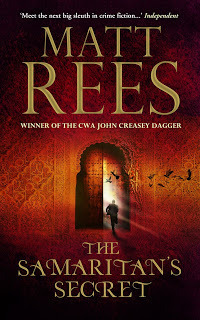
In the post yesterday, I received some copies of the small-format UK version of my third Palestinian crime novel THE SAMARITAN'S SECRET from my editor at Atlantic, the delightful Sarah Norman. The large format edition, published in January, was green. The new one, which'll be published on July 1, is brown. I like it because it's slightly larger (B format in publishing parlance) than the tiny A-format versions of my first two novels, released in the UK as THE BETHLEHEM MURDERS and THE SALADIN MURDERS.
Over at my agent's office, I also picked up copies of my first novel in the French pocketbook version. LE COLLABORATEUR DE BETHLEEM (as THE COLLABORATOR OF BETHLEHEM is known to thin, well-coutured ladies and men who shrug a lot when they say "Boff!") has been nominated for the Prix des Lecteurs des Livres de Poche.
Before I tracked across my agent's courtyard with my pile of French pocket books, I signed a contract for the publication of my first novel in Greek. I'll be with Kastaniotis Editions in Athens. Thus my shelf of foreign-language books will now test my language abilities with one which will be "all Greek to me" and, as my second book came out this month in Holland, "double Dutch."
Maybe the heat's getting to me. With wordplay like that, I ought to get back to the next draft of my novel....

In the post yesterday, I received some copies of the small-format UK version of my third Palestinian crime novel THE SAMARITAN'S SECRET from my editor at Atlantic, the delightful Sarah Norman. The large format edition, published in January, was green. The new one, which'll be published on July 1, is brown. I like it because it's slightly larger (B format in publishing parlance) than the tiny A-format versions of my first two novels, released in the UK as THE BETHLEHEM MURDERS and THE SALADIN MURDERS.
Over at my agent's office, I also picked up copies of my first novel in the French pocketbook version. LE COLLABORATEUR DE BETHLEEM (as THE COLLABORATOR OF BETHLEHEM is known to thin, well-coutured ladies and men who shrug a lot when they say "Boff!") has been nominated for the Prix des Lecteurs des Livres de Poche.
Before I tracked across my agent's courtyard with my pile of French pocket books, I signed a contract for the publication of my first novel in Greek. I'll be with Kastaniotis Editions in Athens. Thus my shelf of foreign-language books will now test my language abilities with one which will be "all Greek to me" and, as my second book came out this month in Holland, "double Dutch."
Maybe the heat's getting to me. With wordplay like that, I ought to get back to the next draft of my novel....
Published on June 26, 2009 00:13
•
Tags:
athens, awards, bethlehem, collaborator, france, greece, holland, israel, jerusalem, kastaniotis, murders, omar, palestinians, samaritan-s, secret, yussef
Hot Reading in East Jerusalem!
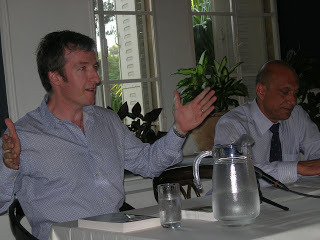
This weekend I was the guest of Munther Fahmi, who runs the excellent bookshop at the American Colony Hotel in East Jerusalem, for a reading from my newest Palestinian crime novel THE SAMARITAN'S SECRET. Munther and I have been scheming for some time to organize an event, so it was great to finally get it together.
I knew it'd be an interesting crowd at the Colony, which manages to be something like neutral ground (although many Israelis might dispute that) in Jerusalem. There were foreign journalists and diplomats, Israelis and Palestinians among the sizeable crowd, including some old friends I haven't seen for some time. Oh, and tourists, too -- a rare species since the intifada, but I signed for visitors from Berlin and Seattle, Ireland and Serbia.
I was also delighted that one of the people on whom I based the character of a World Bank worker in THE SAMARITAN'S SECRET happened to be staying at the Colony this weekend. I was able to give him the news that I'd turned him into a woman and changed his employer. He seemed pleased with both alterations, and I hope he enjoys the book.

I've edited the photos so that you can't see how hot it became in the room. By the time I was signing the books at the end I was rather inelegantly dripping with sweat. The alternative, of course, was the honking of passing Arab wedding convoys and, as antiglobalization activist Naomi Klein discovered when the windows were opened to let in some air for her reading immediately after mine, the evening call to prayers by the muezzin at the mosque next door. (It's the Mosque of Sheikh Jarrah, named after Saladin's doctor, whose tomb it houses.)
To get on Munther's mailing list for future readings at his excellent bookshop, write to him at bookshopat@gmail.com.
Published on June 28, 2009 03:05
•
Tags:
appearances, book, doctine, globalization, ireland, islam, israel, jerusalem, klein, naomi, nonfiction, omar, palestine, palestinians, samaritan-s, samaritans, secret, shock, tour, yussef



